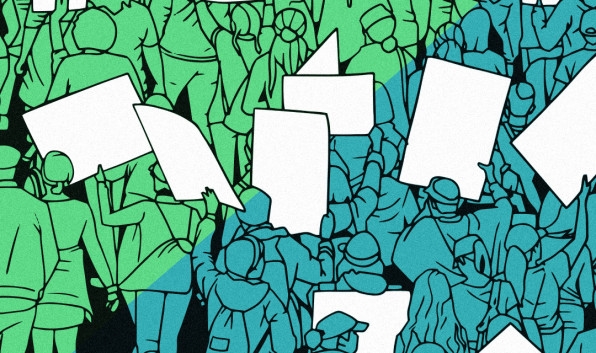This Survey Lets You Help Design An Activist Agenda For 2018
Exactly one year ago, cities and organizers were readying themselves for the Women’s March, the largest day of protest in history that took place on January 21, 2017, one day after the inauguration of Donald Trump. A full calendar rotation later, anniversary marches will flood the streets. But beyond public demonstrations, some activists are looking to translate the energy of the marches into policy and action.
March On, an organization that spun off the original Women’s March group last year, is focusing its energy this year on galvanizing people to vote during the elections this year (during the midterms, they’ll be organizing community marches to polling places). But the voting effort, says March On’s executive director Vanessa Wruble, has to come from a place of consensus about what we want to see our elected officials advocating for.

To that end, on January 20, March On is launching a two-week long effort to crowdsource its policy agenda. The name, Operation Marching Orders, derives from the idea that the agreed-upon action areas will become the “marching orders” the organization delivers to elected officials. The initiative will take the form of an online poll, in which participants, which March On refers to as the “marchroots,” can express an opinion about the organization’s future policy platform. “The idea is that this is a people’s movement,” Wruble says, “and we need to find out from the people how they want to articulate who we are as a platform, and what we’re fighting for.”

When planning for the Women’s March (with which Wruble was involved) got underway in late 2016, “everything happened so fast that we were able to put together some unity principles, but we never got to fully articulate what that meant for what we wanted from our elected officials.” With March On’s work focused this year on policy and the midterm elections, crowdsourcing its agenda “is an opportunity for us to reach out to our base and build this movement from the ground up,” Wruble says.
The poll will take the form of an interactive experience hosted on the platform Polis, in which participants will be able to comment on and see how others have responded to various policy proposals and action areas. Under one main statement or question–for example, “do you think we should advocate for equal pay for women?”–participants will be able to voice agreement or disagreement with a variety of more detailed statements about the topic at hand. Participants will also be able to add their own statements, but these submissions, Wruble says, will be strictly moderated to screen for duplicates and trolling.

While anyone at all can access the poll and vote on March On’s platform from the comfort of their own computer, what the organization is really hoping for, Wruble says, is that people use the anniversary of the Women’s March to organize Operation Marching Orders parties, in which people gather to discuss the issues in person while also registering their opinions on the online poll. “It’s the ideal setup–you march in an anniversary march, then get together and discuss how we move forward,” Wruble says.
One the poll closes and March On finalizes its agenda, the organization will use the input from participants to craft a statement about what the organization wants for its future, and what it and the marchroots expect from elected officials. From there, March On will begin endorsing candidates, whom they will support through its marchroots-funded Super PAC, the Fight Back PAC.
Fast Company , Read Full Story
(13)














